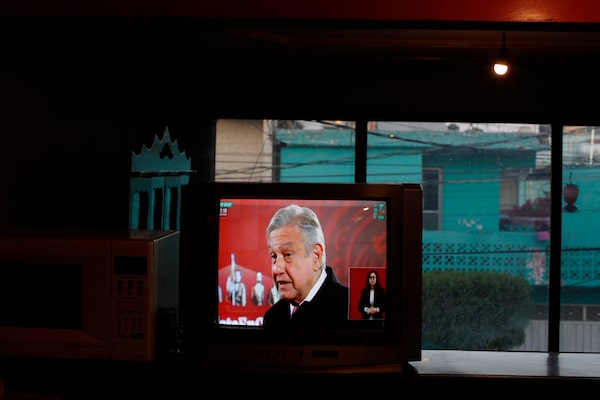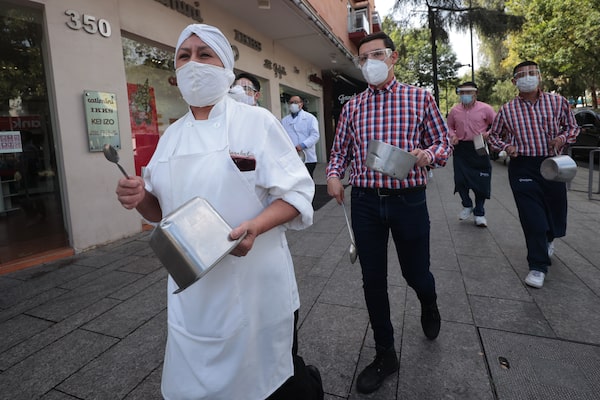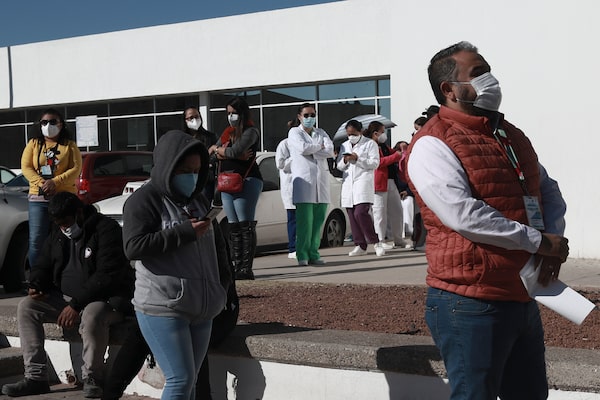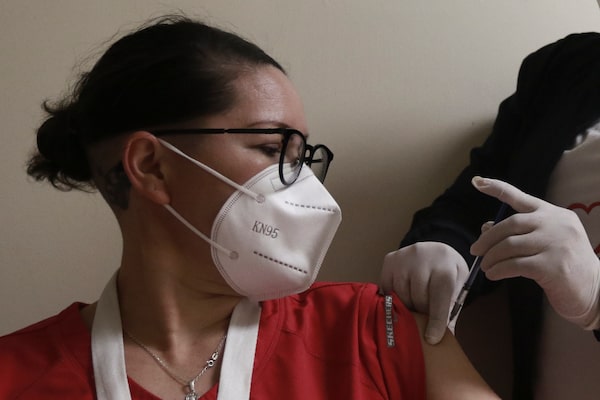
Mexico's President Andres Manuel Lopez Obrador is seen on a TV screen in Neza, Mexico State, on the outskirts of Mexico City, on Dec. 18, 2020.Rebecca Blackwell/The Associated Press
The pandemic has taken a horrible toll on Mexico. The number of dead has topped 137,916 – fourth-highest in the world – the economy has crashed, and more than 2,400 medical personnel have succumbed to the coronavirus.
Yet Mexico has confronted COVID-19 in an unconventional way: austerity. The country spends little on testing and contact tracing and has put scant new funds into the health budget – even as President Andres Manuel Lopez Obrador pushes ahead with a fully funded suite of megaprojects such as a train running around the Yucatan Peninsula.
And while countries such as Canada have introduced income-support programs such as the CERB, and the United States approves another round of relief cheques, Mr. Lopez Obrador – a populist and self-identified leftist – has doubled down on thrift.
“We’re not indebting the country,” the President, commonly called AMLO, said in a video released Jan. 2. “Taxes weren’t increased, gasoline costs less than when I became President, [and] there’s no additional indebtedness. We’re emerging from this with a formula of not allowing corruption, making government restrained and austere, in which there are no extravagances or superfluous spending.”
Ambulances carrying patients with symptoms of the coronavirus disease are queued outside the General Hospital as paramedics are searching for available hospital beds, in Mexico City on Jan. 7, 2021.LUIS CORTES/Reuters
AMLO has slashed the size of government, cut bureaucrats’ Christmas bonuses and raided the assets of more than 100 public trusts – which supported filmmaking, scientific research, protecting human rights and disaster relief – to pay for the pandemic response. He even organized a raffle for the presidential aircraft, a Boeing 787 Dreamliner that he has often derided as a symbol of his predecessors’ excesses; of course, no ordinary Mexican could afford to maintain such a plane, and the prize was eventually converted to cash, spread among 100 winners.
On Friday, he announced plans to place the country’s transparency institute and other autonomous agencies under the control of federal ministries, arguing that the cost savings would be put toward the pandemic – though critics see it as a pretext to expand the power of the presidency.
The President also has rejected tax relief and bailouts for businesses, pointing to Mexico’s history of governments rescuing companies accused of corruption and cronyism. He has instead offered small businesses loans of 25,000 pesos ($1,590) and bumped up some social program payments. In lieu of borrowing, he has twisted the arms of some of the country’s biggest corporations to settle old tax disputes, including Walmart de Mexico, creating a surge in government revenues.
Restaurant employees take part in a pan-bashing 'cacerolazo' protest after the government implemented closure measures of their activities, on Jan. 11, 2021.CARLOS JASSO/Reuters

Restaurant workers protest in the streets of Colonia Polanco on Jan. 12, 2021 in Mexico City.Hector Vivas/Getty Images
“Those who felt like the owners of Mexico, the big corporations and banks, didn’t pay taxes. Now they’re paying,” he said in his New Year’s message. “There’s no more tax forgiveness. That’s why we have healthy public finances and won’t request additional credit.”
Still, Mexico’s pandemic relief amounts to just 1.1 per cent of GDP, according to the Economic Commission for Latin America and the Caribbean, even though AMLO ran on a platform of putting the poor first.
“The macroeconomic policy of AMLO so far is Herbert Hoover. Instead of trying to bail things out, he’s retrenching and avoiding Keynesian responses,” said Jeffrey Weldon, a political science professor at the Autonomous Technological Institute of Mexico. “He has cut the size of the bureaucracy significantly, especially before the pandemic. No leftist government does that … No leftist government adamantly refuses to raise taxes. No leftist government is this resistant to debt.”
AMLO’s austerity comes authentically, according to analysts, and predates the pandemic. He often quipped in his 2018 campaign, “You can’t have a rich government with a poor population.”

Health care workers wait in line outside General Hospital to receive the Pfizer COVID-19 vaccine, on the first day of coronavirus vaccinations in Ciudad Juarez, Mexico, on Jan. 13, 2021.Christian Chavez/The Associated Press
He wears rumpled suits, travels on commercial flights and prefers taco stands to fancy restaurants. He counsels the country to stay out of debt, avoid unnecessary spending and eschew materialism. He also claims few assets – rare in a political system rife with inexplicable fortunes – and says he’s never had a credit card.
“Austerity is a tenet of faith for him,” said Valeria Moy, director of the Mexican Institute for Competitiveness, a think tank. She attributes this to his upbringing as the son of shopkeepers and Mexico’s past difficulties with foreign debt.
“The president’s mentality is one of a shopkeeper,” she said. “He sees debt as ... something intrinsically bad. He doesn’t understand debt as a financial instrument.”
But his focus on austerity can be confounding. AMLO rails constantly against what he calls the neoliberal period – marked by NAFTA and privatizations – and calls opponents “conservative.” Yet he has imposed cutbacks so severe that federal employees are not allowed to charge their cellphones at work.
AMLO, who doesn’t wear a mask unless it’s absolutely required, has coupled his austerity talk with libertarian rhetoric. “It’s prohibited to prohibit,” he has said often when the subject turns to curfews and travel restrictions (Mexico doesn’t require COVID-19 tests from international travellers or require quarantines), and insists lockdowns would most harm the informal economy.

A pediatric nurse receives a dose of the Pfizer vaccine in Ciudad Juarez, Mexico.Christian Chavez/The Associated Press
The new B117 variant of the coronavirus arrived in Mexico with an international traveller in late December, health officials in the border state of Tamaulipas announced Sunday. New cases of Covid-19 also hit a record high Saturday with 16,105 cases confirmed; the daily death count reached a record 1,314 lives on Tuesday. And excess mortality in Mexico City was revealed to be 51,444 deaths in 2020 – 97 per cent higher than in 2019 – making it the most lethal capital in the world, according to researchers publishing in the magazine Nexos.
AMLO, meanwhile, spoke optimistically of the situation, telling the country in a Saturday stump speech: “It’s not going too badly for us.”
Polls show his approval rating hovering around 60 per cent.
Rosina Napoles, 70, supports him. She receives a stipend for seniors of roughly $160 every two months. But Ms. Napoles, who picks and sells nopales (cactus pads) in the far south of Mexico City, says sales have suffered amid the pandemic – to the point that she can’t afford her diabetes medication and has turned to a parish soup kitchen for assistance.
“He would like to do so much for us,” she said. “But there are so many people … He’s doing what he can.”
Our Morning Update and Evening Update newsletters are written by Globe editors, giving you a concise summary of the day’s most important headlines. Sign up today.